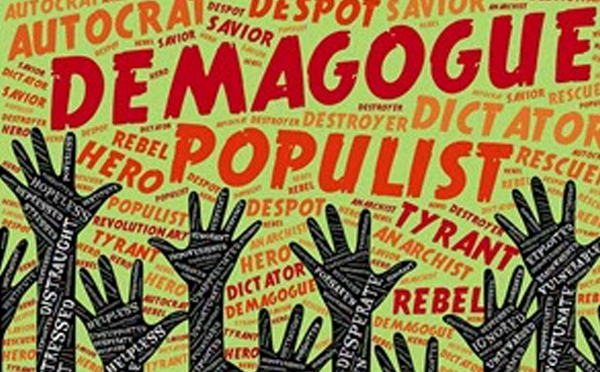Populism and Education: the Indian and Turkish Perspectives
Posted on : February 25, 2020Author : AGA Admin

Theorization on the politics of populism isn’t new though the existence and usage of the phenomenon in the Civil Society and the State predates the culture of theorization. It is in such a context that there is a need to acknowledge that within a very short span of time, socio-economic and political structures have undergone a massive change. Once when neoliberalism and globalization dominated world affairs, cosmopolitanism and multiculturalism were accepted as the ideological bases that seemed to guide the nation-states in their achievement of a linear growth, especially with the end of the Cold War. Down the years, though those two notions did not lose their sheen, it may be noted that communitarianism—as a tangible dimension of the politics of populism has been strongly visible in the regimes of a few countries.
As Ferdinand Tonnies had theorized the Gemeinschaft (“community”) und Gesellschaft (“society”), the former has indeed jeopardized the later in its heterogeneous development, as is pointed out by Francis Fukuyama in his seminal work ‘Identity’. It is this jeopardy that has fuelled the growth of populism. This false sense of communitarianism provides a prevalent sense of elitism based on factors such as class, religion etc. Populism can take various forms. However, in order to keep the narrative straight, I shall focus on Right Wing Populism.
Populism in India isn’t anything out of the box. Indira Gandhi’s populist policies of indiscriminate nationalization in the 1970s combined with the slogan of ‘Garibi Hatao’ (Remove Poverty) are quite symbolic, in addition to her personal charisma as a leader of the masses, in the formation of Left Wing Populism in India. In the present times, populism has arguably reinvented itself in a new avatar; its ‘right-wing’ nature being in stark contrast to the Left Wing Populism of yore. The Bharatiya Janata Party (BJP) under Narendra Modi has been in power for over a term now. First securing power in 2014 and returning back with a resounding victory in 2019, Modi’s politics has consolidated its place in India, at least for the time being. Usurping power through the rhetoric of neo-Hindutva, a combination of Savarkar’s idea of Hindutva and the Gujarati ‘asmita’ (identity), Modi has positioned himself firmly at the helm of Indian political power.
Populism, as I have mentioned earlier, has always maintained an animosity with a certain form of elitism. Its power structures revolve around the consolidation of majoritarian identity formation. A primary weapon against this process of totalitarianism is education. As a result of this, populists have always targeted institutions par excellence. A significant populist move against educational institutions can be seen at large in Turkey and India. Reccep Tayyip Erdogan, the present Prime Minister of Turkey, belonging to the Justice and Development Party, has specifically targeted the educational institutions in his country, by invoking a sense of plebeian interests amongst his electorate, effectively curbing funds for the Ankara University and other public universities in Turkey, as well as ousting those faculty with a voice of dissent, labeling them as representatives of Kurdish interests. A similar process is also at play in Indonesia. One important thing to note in this respect is the feared process of Islamisation. The trajectory of its development shares much similarity to the progress of greater Hindutva in India.
Populist politics considers the university space in particular and educational institutions in general to be disciplining grounds, with the students acting as simple cogs in the machine, as a result of which, the focus is upon vocational and technical courses—a trend that is noticeable in India as well. The implementation of the New Education Policy, the undercut in the funding of Central and State Universities, the undermining of the University Grants Commission (UGC), are all measures that are being implemented here the brunt of which is faced by the masses. The growing process of privatization is reflected not only in the functioning of the rail and air transport networks, and the management of places of historical importance with severe cuts in funding, but also in the spectrum of education.
The attack on educational institutions by the Right Wing extremists in India is something that is a familiar trait under populist regimes visible in a recent arson at the Jadavpur University Campus in Kolkata that took place after the alleged manhandling of an MP during his visit in the campus premises. Jawaharlal Nehru University, Delhi University and University of Hyderabad, too have faced turmoil in recent years. The term ‘regime’ becomes very important in this context as it might be argued that India is undergoing the process of entering into the phase of a regime. Thereby, it can be said that there is the existence of a populist narrative under the veil of a protracted authoritarianism, which is very novel, in its similarity with the Turkish experience, as pointed out by Ajay Gudavarthy.
The crushing of the voice of dissent is an authoritarian act, the attack upon educational institutions under the guise of disciplining and controlling, and labeling it as anti-elitist, is a populist act, in operation to implement a form of hegemonic stability, in the manner of preponderance. The attack on educational institutions is particular and its nature is similar in both India and Turkey. The linear growth of attacks upon academics and public intellectuals who have a voice of dissent is something that is extremely alarming. The additional crackdown upon spaces reserved for education is also extremely alarming. The lasting impression is that a democracy covered in darkness under the fear of a totalitarian regime politics, the effects of which can be of profound destruction and grotesqueness, the growth of a 1984esque “thought crime” situation.
Raunak Bhattacharya
Intern, AGA
The views and opinions expressed in this write-up are those of the author and do not reflect the official position of Asia in Global Affairs.





Leave a Reply